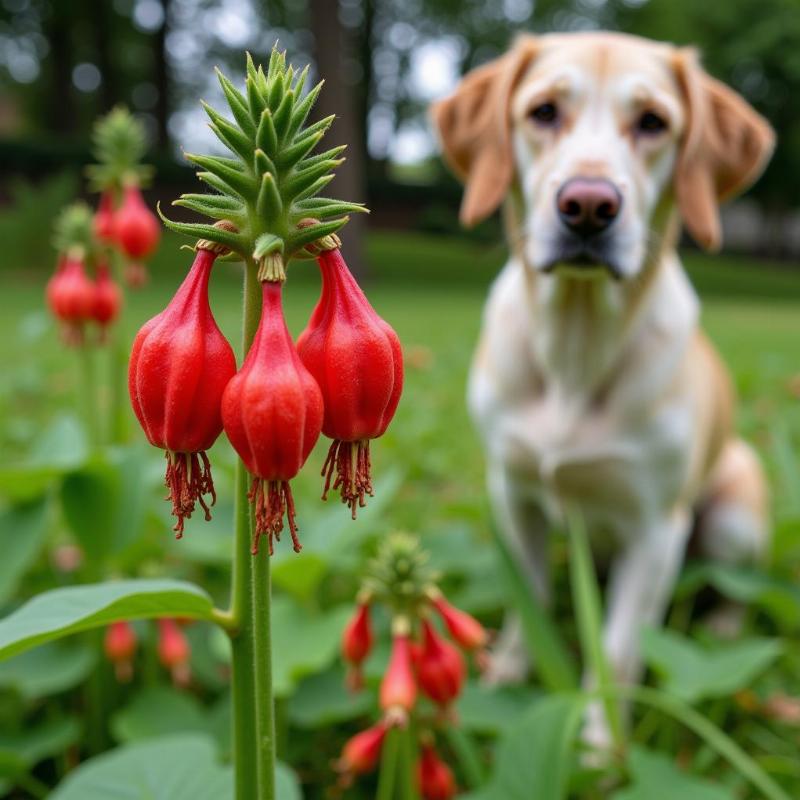Turk’s Cap, a vibrant and beautiful flowering plant, adds a touch of tropical flair to gardens across the US. But if you’re a dog owner, you might be wondering: is this exotic beauty safe for my furry friend? The answer, thankfully, is generally yes. Turk’s Cap (Malvaviscus arboreus) is not listed as toxic to dogs by the ASPCA or other reputable veterinary resources. However, “non-toxic” doesn’t necessarily mean “risk-free.” Let’s explore what you need to know to keep your canine companion safe around this popular plant.
Understanding Turk’s Cap and Potential Risks to Dogs
While Turk’s Cap isn’t inherently poisonous, ingesting large quantities of any plant material can cause gastrointestinal upset in dogs. Symptoms might include vomiting, diarrhea, and abdominal discomfort. Think of it like this: eating too much grass can make your dog throw up, and the same principle applies to Turk’s Cap. Also, some dogs might have individual sensitivities or allergies to plants, even non-toxic ones.
 Dog Near Turk's Cap Plant
Dog Near Turk's Cap Plant
For puppies and particularly inquisitive dogs, the vibrant red flowers might be tempting to chew on. While not toxic, the plant’s fibrous leaves and stems could potentially cause mild irritation to the mouth and throat or pose a choking hazard, especially for smaller breeds.
Keeping Your Dog Safe Around Turk’s Cap
A few simple precautions can ensure your dog enjoys the garden without any Turk’s Cap-related tummy troubles. The best approach is to discourage your dog from interacting with the plant altogether. Training techniques like “leave it” can be incredibly helpful. Consistent reinforcement will teach your dog to avoid the plant.
If your dog does ingest a small amount of Turk’s Cap, monitor them closely for any signs of discomfort. In most cases, they’ll be perfectly fine. However, if you notice persistent vomiting, diarrhea, or any other unusual symptoms, contact your veterinarian immediately. It’s always better to err on the side of caution, especially with our furry family members.
Identifying Turk’s Cap and Other Potential Garden Hazards
Turk’s Cap is easily recognizable by its unique, closed flowers that resemble unopened hibiscus blooms. They are typically bright red, but can also be pink or white. Familiarizing yourself with the plant’s appearance can help you identify it in your garden and take appropriate measures.
Remember, while Turk’s Cap is generally safe, many other common garden plants are toxic to dogs. These include azaleas, rhododendrons, sago palms, and tulips. Before introducing any new plants to your garden, always research their toxicity to pets. A quick search on the ASPCA website can provide valuable information.
Conclusion
While Turk’s Cap is not considered toxic to dogs, it’s crucial to supervise your pet around this and any other garden plants. Taking proactive steps to prevent ingestion and being aware of potential risks can help ensure your dog enjoys a safe and happy environment. A little vigilance goes a long way in protecting our canine companions.
FAQ
- What should I do if my dog eats a lot of Turk’s Cap? Monitor your dog for any signs of gastrointestinal upset, such as vomiting or diarrhea. If symptoms are severe or persistent, contact your veterinarian.
- Are all parts of the Turk’s Cap plant non-toxic? Yes, all parts of the plant are considered non-toxic to dogs, but ingestion of large quantities can cause mild digestive issues.
- What are some common signs of plant poisoning in dogs? Signs can vary depending on the plant, but common symptoms include vomiting, diarrhea, lethargy, loss of appetite, tremors, and seizures.
- How can I prevent my dog from eating plants in my garden? Training, using deterrents, and creating physical barriers can help discourage your dog from accessing plants.
- Are there any safe alternatives to Turk’s Cap for dog-friendly gardens? Yes, consider planting dog-friendly flowers like sunflowers, zinnias, and snapdragons.
- Where can I find a reliable list of plants that are toxic to dogs? The ASPCA website provides a comprehensive list of toxic and non-toxic plants for pets.
- What should I do if I suspect my dog has been poisoned by a plant? Contact your veterinarian or the ASPCA Animal Poison Control Center immediately.
Beautdogs.us is your trusted source for comprehensive and engaging information on dog care and companionship in the US. We offer expert advice on dog breeds, grooming, nutrition, and training, along with insights into the latest pet care trends. Whether you’re a new dog owner or a seasoned enthusiast, Beautdogs.us has everything you need to ensure your furry friend lives a happy, healthy life. Contact us today for all your dog care needs! Email: [email protected], Phone: +1 501-555-7529. Visit us at Beautdogs.us.